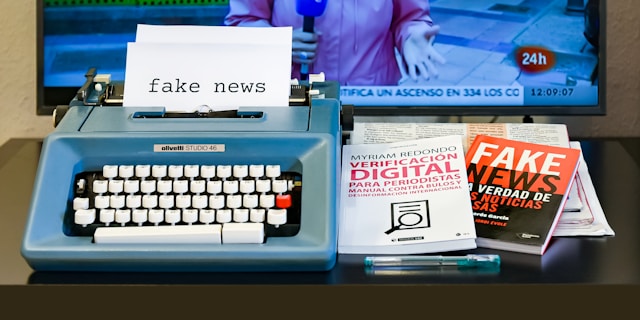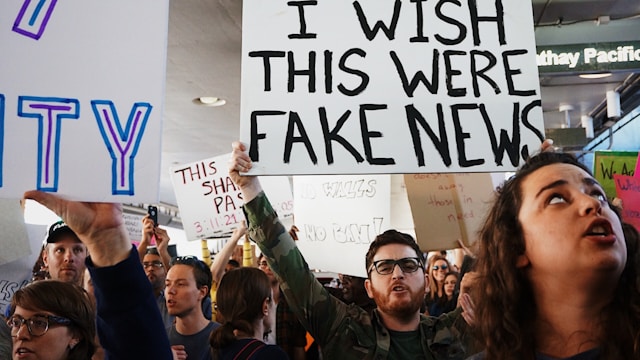Can You Trust What You See on TikTok?
Like other social media platforms, TikTok can become a vehicle for fake news, conspiracy theories, clickbait, and other unreliable information. Can you trust what you see on TikTok? How does the platform balance free expression and content moderation?
Read on as we unpack the answers to these questions!

How TikTok Handles Fake Information
Can you trust what you see on TikTok news pages? The answer mostly depends on who disseminates the information.
If you’re following long-established and trusted news sources on TikTok, their news is almost always reliable and fact-based. You can expect them to publish a correction ASAP when they make a mistake.
However, trustworthy news agencies and media organizations are not the only sources of real-world updates on the platform. Videos from pages that rely on clickbait and controversial content often go viral because of their sensational nature.
Influencers with massive followings can become willing or unsuspecting peddlers of misinformation.
Fortunately, TikTok has checks and balances in place to maintain integrity and authenticity on the platform. TikTok enforces strict policies regarding:
- Misinformation
- Civic and election integrity
- Synthetic and manipulated media
- Fake engagement
- Unoriginal content and QR codes
- Spam and deceptive account behaviors

Misinformation
TikTok acknowledges that people may have different opinions. However, the platform does not allow “inaccurate, misleading, or false content that may cause significant harm.”
TikTok defines “significant harm” as that which may cause “physical, psychological, or societal harm, and property damage.” It excludes commercial and reputational harm.
The platform has a database of previously fact-checked claims and employs independent fact-checking partners to determine For You Feed (FYF) content eligibility. If a piece of content requires further fact-checking, TikTok makes it temporarily ineligible for the FYF.
Civic and Election Integrity
TikTok does not allow “paid political promotion, political advertising, or fundraising by politicians and political parties.” The platform also prohibits content that spreads misinformation about the following:
- How to vote
- Voter registration
- Political candidates’ eligibility requirements
- Ballot-counting and election certification processes
- Final outcome of an election
Synthetic and Manipulated Media
TikTok requires disclosure of “synthetic or manipulated media that shows realistic scenes.” Creators can label their content with a sticker or caption that identifies it as “synthetic,” “fake,” “not real,” or “ altered.”
Every post now also has a content disclosure option to let others know if it’s AI-generated. The platform does not allow synthetic media if:
- It contains the likeness of a real private figure.
- It represents a public figure and is used for endorsement, harassment, to promote hate, or violates other TikTok policies.

Fake Engagement
TikTok prohibits services and activities that artificially increase engagement or deceive TikTok’s algorithm. The platform removes fake followers or likes from an account as soon it detects the inauthentic numbers.
Content that tricks or manipulates users to artificially inflate metrics is ineligible for the FYF.
Unoriginal Content and QR Codes
TikTok does not allow any violation of another person’s intellectual property rights. Unoriginal or reproduced content without creative changes or which contains QR codes is ineligible for the FYF.
Spam and Deceptive Account Behaviors
TikTok does not allow spamming and account behaviors intended to mislead others, such as using spam or impersonation accounts. The exceptions are parody or fan-based accounts, but TikTok requires these accounts to disclose that they’re such.
The platform allows users to set up multiple accounts “to create different channels for authentic creative expression.”
However, it prohibits using multiple accounts for deceptive purposes or bypassing TikTok’s rules or enforcement. A user whose account has been banned or restricted must not set up a new account to get around the ban/restriction.

Can You Trust What You See on TikTok’s For You Feed?
The accounts a user follows and the types of content they interact with shape their reality through their FYF. And this is where TikTok’s biggest strength — its algorithm — also becomes its biggest disadvantage.
The algorithm may inadvertently feed a user’s misconceptions, conspiracy theories, or negative biases based on the types of content they like to consume.
Each user is ultimately responsible for the content curation of their FYF and how it influences their perceptions of reality. A user is equally responsible for the content they share, whether original or reposted.
Many TikTok videos are meant as jokes, but they end up going viral for the wrong reason—because viewers take them seriously. The same goes for unfounded claims regarding health, science, medicine, etc.
TikTok states that “free expression is not an absolute right.” The platform always considers the right to free expression “in proportion to its potential harm.”
Free expression also does not guarantee the amplification of content on the FYF if the content may cause harm. TikTok reserves the right to remove any content that violates its Community Guidelines and Terms of Use.
If you’re following online news sources, always look for the blue checkmark. The checkmark is TikTok’s verified badge and adds a layer of credibility to the page.
If some of your favorite content creators share original content or repost videos designed to influence perceptions, take the information with a grain of salt. Always verify information through independent research.

Build Credibility and Promote Authenticity in Your TikTok Community
Today’s easy access to information is a double-edged sword. Whenever you open your social media app, you make yourself vulnerable to fake news, misinformation, propaganda, etc.
At the same time, you can gather more information to establish a piece of content’s veracity or lack thereof.
Can you trust what you see on TikTok? The cold-war adage, “Trust, but verify,” no longer cuts it. It’s always safer to verify before you trust anything you see online.
Do your part in promoting integrity and authenticity on TikTok. Build your credibility with a solid following of genuinely interested users.
Sign up for a High Social plan to ensure you connect with genuine users whose interests align with yours.
Take advantage of High Social’s advanced, proprietary AI technology to boost your audience-targeting capability. Start growing your TikTok today!
TikTok Tips













